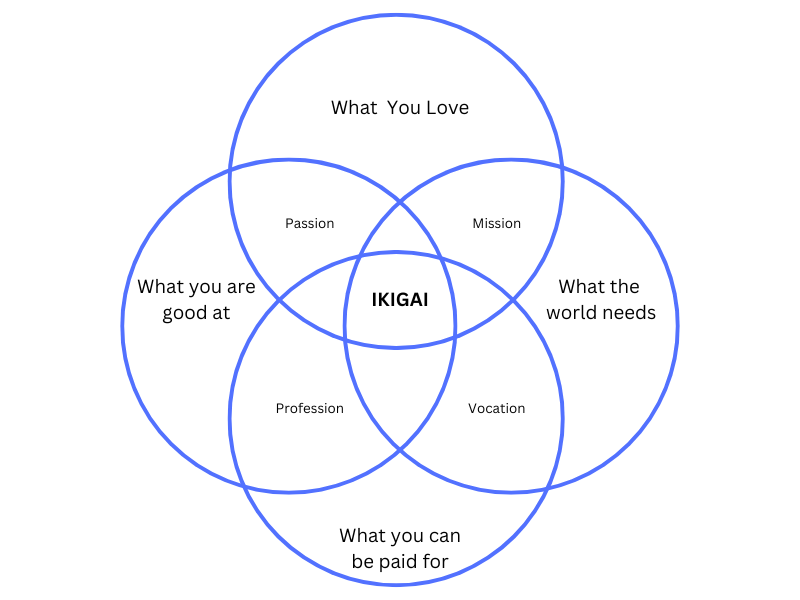How I found my Ikigai and turned it into a six-figure income!!!!!
Haha, just kidding. 😂 But I have spent a lot of time this year finding & following my Ikigai. No doubt, the income will come, too.
I learned about the idea of Ikigai while giving one of my Uber passengers a ride. We were discussing our philosophies for happiness and living a good life (yup, if you come Uber with me, you might find yourself having this kind of conversation!) I mentioned that I had given up working in a corporate job in the high-tech sector to pursue writing and acting for my career. My rider asked me if I had heard of Ikigai. When I told him no, he told me that it’s a Japanese idea to find things you enjoy doing and focus your time and energy on doing them. Finding and following your Ikigai is a path to enjoying a happy and purpose-filled life. This idea seemed very interesting, so after I dropped my rider off at his destination and went home, I began reading about and exploring Ikigai more deeply.
If you’re already familiar with Ikigai in the West, you will have seen this popular diagram that aims to illustrate it.

To summarize what the above diagram simply, the aim of Ikigai is to understand and do these four things:
What you love
What you are good at
What the world needs
What you can be paid for
Then, you focus your time and attention on doing these things, leading you to enjoy a happy and purpose-filled life.
Although Marc Winn’s diagram is a helpful way to summarize the concept, I believe there is more to Ikigai than can be conveyed by a simple diagram. As someone who lives in North America, I think we feel pressure to turn everything we do into a product we can sell or some system that will inevitably generate money. You know, we’ve all seen these types of headlines: “How I found my Ikigai and turned it into a six-figure income!!!!!” (Ha, ha, I wish…)
I do not believe a person in Japan following their Ikigai cares if it results in a six-figure income. Their Ikigai could be gardening or spending time with their grandchildren and they would be perfectly content. Don’t get me wrong; if I happen to make a six-figure income, I won’t turn it away. In fact, I feel tremendous gratitude for the money I earn from my book royalties, acting work, and driving.
Tim Tamashiro’s excellent book, “How to Ikigai: Lessons for Finding Happiness and Living Your Life's Purpose (Ikigai Book, Lagom, Longevity, Peaceful Living),” describes the concept of “half kigai” and “full Ikigai.” Half Ikigai is about “What you love” and “What you are good at,” while full Ikigai is what you get when you add “What the world needs” and “What you can be paid for” circles.
Half Ikigai is about finding happiness, contentment, and purpose in what you do. What do you most enjoy doing when you first wake up? What are the things you most look forward to doing? For now, we’re ignoring “What you can be paid for” and “What the world needs.” This is because if you don’t have a strong sense of your half Ikigai, you’re not going to be happy no matter how much money you earn. Let me give you an example (again from driving…)
I tend to drive a lot of lawyers to work. They’re lovely people. They’re smart and can be very wealthy. Guess which group typically expresses dissatisfaction with their work? Guess which group often expresses wishing they did something else for their careers? Lawyers. I don’t know why this is. I imagine that law is high-pressure, demands a lot of time, and essentially, the job is sorting out other people’s problems within the complexities of the law. Indeed, many lawyers love their work, but in my experience, it sounds like a difficult path, and although it can be very lucrative, it may not lead many people to their Ikigai.
So, if you are considering Ikigai for the first time, start with half Ikigai: focus on understanding what you love and are good at and worry less about what the world needs and what you can be paid for.
So, what is my Ikigai? I think I have a reasonable grasp of this.
First: writing. If I get up in the morning and the first thing I do is write, I am happy. Am I good at it? Yes, and I’m getting better as I practice. Does the world need writers? Yes! Can I be paid for it? So far… YES!
How about acting? Sure, I am happy when I do it. Am I good at it? (Hmmm… I think so but I’m less sure.) Does the world need actors? Definitely! Can I be paid for it? (I haven’t made any money from acting for a long time but I see the potential…)
What about driving? I’m good at it and I enjoy it. Does the world need more drivers? (That’s somewhat debatable, but I suppose it does until robots replace us entirely.) Can I be paid for it? (For sure, but not as much as writing and acting can potentially pay.) There’s nothing wrong with driving but I will probably quit as soon as I can earn enough from writing and acting. So professional driving probably isn’t my Ikigai.
Here Comes the Hard Question
Now, I’m going to hit you with a hard question. What’s your ikigai? Can you articulate it? If you can’t, that’s okay. If you’re like most of us, we haven’t been trained to contemplate a question like this. In Western society, we’ve been taught to get things done, multi-task, and produce productivity while optimizing our optimization. In short, we’re busy.
If you’re curious about understanding your Ikigai, here’s a suggestion that takes less effort than sketching a Venn diagram. Ask yourself these two questions:
What would you do if you woke up tomorrow morning and had no responsibilities? (Watch cartoons. Obviously. 😝 ) Seriously, what would you do?
What would you do even if you weren’t getting paid any money to do it? (Maybe, writing that article on Substack you’ve been meaning to get to. Writing is always a good one…)
Asking yourself those questions will reveal some clues about your Ikigai.
As for me, I’ll keep working on my writing and acting. If anything else comes along that I enjoy as much, I’ll do that too. (Watch cartoons. 😉)
Enjoying Chasing Dreams?
Subscribe for free weekly articles.
Become a Paid Subscriber for exclusive articles, receive feedback on your writing, plus a free e-copy of my book “Meeting People in Real Life.”
Become a Founding Member and enjoy all the Paid Subscriber benefits and private coaching.





